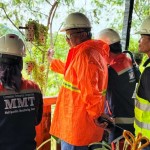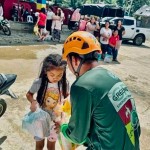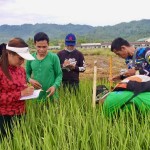Canatuan, Tabayo, Siocon, Zamboanga del Norte / February 2013 – It is almost dark in Tanuman, a settlement of the Subanon tribe up in Baliguian, Zamboanga del Norte. Nanida Limbang, 59, is starting to feel the cold wind on her face. Unmindful of the noise of her grandchildren, she sits still on her favorite rattan chair. It is in this time of the day that as always, she remembers her third grandson who died without seeing a medical doctor eight years ago.
“It’s time to eat. Come,” her husband Fred, 61, calls her. Their four grandchildren are already on their seats – their eyes glued to their lola (grandmother) who seems deep in reverie.
“If only we had money. If only we had the road that we’re having now, perhaps he would still be alive. He could be in his 5th grade now,” she tells Fred almost in a whisper.
Fred, a descendant of Apo Manglang, the tribe’s most revered timuay (chieftain) can only answer, “Apo Sanag will always protect us from harm, have faith in him.”
13 years ago, Canatuan, the ancestral lands of the Subanon lumads (natives) was haven to illegal miners who came from the different provinces of Mindanao. Couple Fred and Nanida, including their older children were among the workers of the illegal miners. Underpaid and overworked, the couple along with other Subanons virtually became “slaves” in their own homeland.
“Slaves” no more
Fast forward to today, the couple now lives at the Tanuman-Gawad Kalinga (GK) Village, located just a few kilometers away from Canatuan. GK, a non-government organization and TVI Resource Development Philippines Inc. (TVIRD) partnered Fred and Nanida in building their homes along with other Subanons. They were resettled by the company at the height of its gold and silver mining operation mid 2004.
Built on “Kapitbahayan” (neighborhood) concept GK, TVIRD and Subanon beneficiaries plan to construct 100 houses, targeting to complete the first 40 by March this year. Kapitbahayan, refers to the tradition of neighbors helping one another and resembles the ‘bayanihan’ (teamwork) concept practiced by Filipinos.
Fred and Nanida had gone a long way after the death of their grandson. Now they have a house they can call their own.
The advent of responsible mining
TVIRD was the first mining company to operate under the Mining Act of 1995, ramping-up its gold, silver, copper and zinc operations in the locality in which it holds a Mineral Production Sharing Agreement (MPSA) – an authority given by the government over 500 hectares of Subanon anscestral land. In return, the Subanons enjoy basic services that the company extends to them, including a health clinic complete with medical personnel that provide 24/7 service to the community and its employees, schools that provide elementary and high school education, bridges for easier accessibility, and roads that are repaired and properly maintained since then.
Recognizing the need to sustain the tribe’s source of livelihood even after the end of the mine life, TVIRD’s Community Relations and Development Office (CreDO) introduced Sustainable Agriculture Land Technology (SALT), through which Subanon farmers are provided rubber seedlings to be planted within their homelands. Company agriculturists are accessible round-the-clock to assist the beneficiaries with the latest technology. Short term crops were also introduced, like pechay, string beans, horse radish, moringa, and Ceylon’s peanuts or alugbati. Vegetables are even planted inside the premises of the company’s processing plant.
Subanons living at the Tanuman- GK Village are mostly employees of the company. They are fetched daily by service vehicles that will bring them to the plant, while their children who are studying at the nearby government schools are ferried by school buses, courtesy of TVIRD.
Building sustainable communities
Since his retirement, Fred has been focusing on his farm on which he planted rubber and abaca. “These will be our source of income once the company ceases its operation,” Fred said, referring to the conclusion of TVIRD’s mine life by the end of 2013. Subanons living in their ancestral domain have planted a total of 63 thousand rubber seedlings in more than 130 hectares of land.
“The rubber plantations, augmented with coffee and cacao, will be implemented in the Subanon homelands and these will be their source of income when TVIRD leaves,” he said.
He also said that the long-term plan is to transform the Subanon ancestral lands into an agricultural-based center not only for the residents in the area, but also to adjacent communities. As of late, TVIRD entered into a Memorandum of Understanding (MOU) with Kennemer Foods International (KFI) to develop up to 1,600 hectares of arable land within the Subanon’s ancestral lands as well as nearby areas. This aims to sustain some 900 jobs in the immediate community and generate up to 400 more.
“Life was cruel and difficult during the regime of the illegal miners. The old logging roads that connected Canatuan to Siocon and RT Lim in Sibugay province were not always accessible due to big potholes. Rivers had no bridges and sick family members barely had a chance to survive in this situation. Most of our clansmen died without being examined by doctors,” Nanida recalls.
Doors were opened for business opportunities in Siocon, the host municipality, as the 82-kilometer logging road connecting the town to RT Lim in Sibugay Province had been transformed by the company into an all-weather thoroughfare with an annual repair and maintenance budget of Php25 million.
Now a retiree, Fred said the entry of the company has also transformed Canatuan into a bustling mountain community.
“We have electricity and potable water. We have a health clinic with doctors and medical practitioners that care for our sick. TVI delivers on our basic needs that public services cannot.” With these services, TVI has become like a surrogate of the government in this part of the province, according to a priest who visited Canatuan recently.
Investment on education
The company has invested significantly in education, earmarking some Php5 million for 2013 alone.
“Oh, our schools are better equipped compared to other public schools in far-flung barangays of the province. Computers and books were provided,” Nanida proudly tells the story to visitors of their village.
The company’s College Scholarship Program currently provides courses ranging from BS Nursing, Agriculture and Midwifery, to Criminology, Information Technology and Education. Most of the graduates in 2013 are Subanons.
Since the inception of the program, some graduates have been employed by the company while others are gainfully employed in other places. TVIRD’s first Subana scholar, is a registered nurse serving in its Clinic.
Indeed, life for Nanida and Fred today is no longer as difficult ten years ago. The couple feels the Subanons now have better chances of a brighter future. They feel that more opportunities will come their way if TVIRD continues to mine in their homeland.
In October last year, Zenaida Dandana, another tribal leader in Canatuan joined the B’laans of South Cotabato in appealing to the president of the country to look deeply into the plight of the lumads in Mindanao, specifically in Zamboanga del Norte and South Cotabato. Along with tribal leaders, she pleaded to extend the mine life of TVIRD in Canatuan.
“With TVI there’s future for our children,” Nanida said.
Download PDF
Download Word Document



